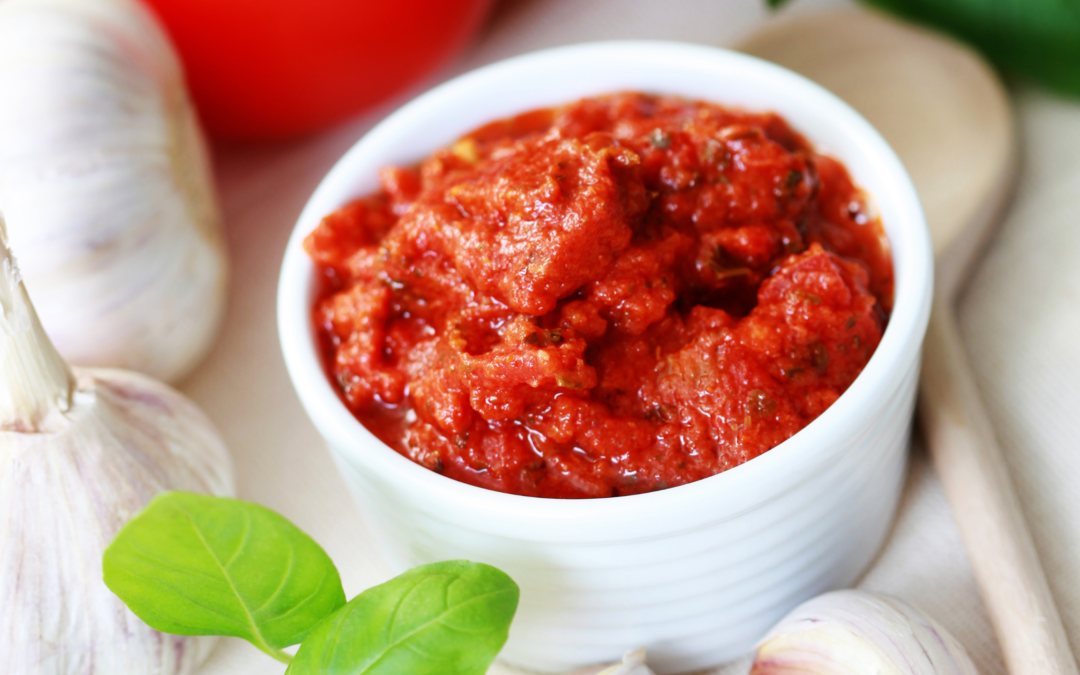
by Tomato Wellness | Sep 28, 2021 | Recipes
Soup’s up! There’s nothing quite like a comforting bowl of tomato soup to warm your soul during the cooler months. That’s why this recipe for Creamy Tomato Soup with Popcorn is a fan-favorite–it’s a unique twist on a classic meal that will leave you feeling cozy. Additionally, these ingredients for this recipe are things you may already have in your pantry (such as diced tomatoes, vegetable broth, honey, and EVOO), making it a healthful, easy recipe to whip up on any weeknight. Plus, tossing a handful of popcorn on top makes for a smile-inducing experience. Serve it with a simple sandwich or a hearty salad, or even enjoy on it’s own. The sky is the limit!
Thanks to the reduced sodium diced tomatoes, this recipe is lower in sodium than the typical canned kind, which makes it a heart healthy option. And, since canned tomato products are rich in lycopene, they also contribute to a reduced risk of cardiovascular diease, as research shows that tomato products play an important role in preventing platelet aggregation (i.e. reducing the amount of blood clots that can lead to cardiovascular diseases). Additionally, tomato products can improve cholesterol by improving lipid profiles, as studies have found that consumption has lead to a significant decrease in cholesterol and triglyceride levels, as well as body weight and fat percentage.
So, go ahead and enjoy this nutrient-dense Creamy Tomato Soup! Your heart, soul, and taste buds will thank you.
Get the full recipe for Creamy Tomato Soup with Popcorn from Ellie Krieger, RDN.

by Tomato Wellness | Sep 27, 2021 | Media Recipe
Explore the possibilities of plant-based goodness with these California Walnut Meatless Meatballs! These meatballs are made with nutritious ingredients such as walnuts, brown rice, roasted red peppers, and tomato paste. These ingredients provide healthy fats, protein, carbohydrates, and fiber to create a balanced dish that will leave you feeling satisfied. Additionally, these meatballs offer a lot of versatility in the kitchen as they can be served with pasta, eaten on a sandwich, or even added to salads!
This recipe has a plethora of health benefits from the walnuts and brown rice, but it also packs a punch when it comes to disease prevention. Tomatoes contain lycopene—a carotenoid that gives tomatoes their vibrant red color and has various health benefits–which plays an integral role in the improvement of heart health, protection from the sun, and reduction in certain types of cancer. The incorporation of lycopene-rich foods, especially tomato-based products, have been shown to boost overall health. Due to the antioxidant properties found in tomatoes, lycopene is readily absorbed from tomato products. When food is readily absorbed by your body, it aids in gut health and digestion. Therefore, the correlation between lycopene, antioxidant powers, and tomatoes is strong, and researchers suggest that tomatoes can play a crucial role in the prevention of cancer and cardiovascular disease.
So, what are you waiting for? Whip these up for your next Meatless Monday and watch them disappear. With so many complex flavors and satisfying ingredients, you won’t even miss the meat!
Get the full recipe for California Walnut Meatless Meatballs by visiting our friends at California Walnuts.
Check out some delicious recipes featuring canned tomatoes:
Pan Seared Pork Chops with Bourbon Peach Compote
Easy Chicken Curry
Pizza Stuffed Chicken
The BEST BLT Dip

by Tomato Wellness | Sep 26, 2021 | Media Recipe
Take a trip to Mexico without leaving your kitchen! This Spanish-inspired Fideo soup (Sopa de Fideo) is perfect to cozy up with any time of the year. Plus, this recipe only requires 30 minutes of cook time, so it is great for a quick weeknight meal!
In Spanish, fideo translates to noodles, which is fitting considering this soup is filled with them! The noodles typically used in this soup are thin and are broken up and browned before being added to the soup. For added flavor, this recipe calls for a can of chili ready tomato sauce, and a can of petite diced tomatoes with green chilies, lime, and cilantro. These flavors pair perfectly together, therefore creating a dish that everyone in your family is sure to love.
Just because this meal can be made in under 30 minutes doesn’t mean that it sacrifices nutrition! In fact, it’s just the opposite thanks to the addition of canned tomatoes. This pantry staple is a great way to keep cook time down while making a meal as nutritious as possible. Before being canned, tomatoes are cooked at peak ripeness, which captures their delicious flavor and enhances the lycopene content (which is a powerful antioxidant). Regularly consuming canned tomatoes can help reduce your risk of diseases like cancer and cardiovascular disease!
Get the full recipe for Fideo soup by visiting our friends at Red Gold Tomatoes.
For other delicious soup recipes, check out some of our favorites:
Green Chile Posole Soup
Curried Leek Vegetable Soup
Classic Tomato Soup

by Tomato Wellness | Sep 22, 2021 | News
Lycopene rich foods may have the ability to prevent central nervous system disease. This carotenoid found in tomato products may be the secret to preventing disease like Alzheimer’s and dementia. Learn more about what science has to say about lycopene rich foods and preventing disease.
It has been proven many times that lycopene (a carotenoid found in tomatoes) is an amazing antioxidant and anti-inflammatory agent that can help to reduce disease such as heart disease, fatty liver disease, prostate disease, and type 2 diabetes. However, it is lesser known that lycopene may also have neuroprotective effects in the central nervous system [1].
Studies have found that lycopene can reduce oxidative stress, neuroinflammation, neural apoptosis, and to restore function of the mitochondria. Lycopene has shown that is has neuroprotective effects, and while evidence has found lycopene supplementation can improve cognitive performance, further research may be able to prove the positive effects on the central nervous system [1]. This would allow lycopene and foods that contain lycopene to be used to prevent or treat disorders of the central nervous system. However, one drawback to using foods that contain lycopene to treat these diseases and disorders is the low bioavailability of lycopene. In some foods it may be too low to raise the level within brain tissue. However, higher concentrations of lycopene (like in a supplement) have been shown to have toxic effects [1].
Canned tomato products could possibly play a role in the treatment of central nervous system diseases and disorders. While some foods may not contain adequate levels of lycopene and would not be effective as a treatment, canned tomatoes have increased bioavailability of lycopene due to heating during processing. While further studies need to be done to prove that canned tomato products could be used in this way, it is a possibility. At the very least, we know that canned tomato products are an excellent addition to the diet and have already been proven to prevent many other diseases.
Learn more about the benefits of lycopene with these resources:
Lycopene and Canned Tomatoes May Help with Cancer Prevention
Health Connection Between Tomatoes and Lycopene
What is Lycopene?
References:
- Chen, D., Huang, C., & Chen, Z. (2019). A review for the pharmacological effect of lycopene in central nervous system disorders.Biomedicine & Pharmacotherapy,111, 791–801. https://doi.org/10.1016/j.biopha.2018.12.151

by Tomato Wellness | Sep 15, 2021 | News
It is no secret that a diet high in saturated fats can lead to high cholesterol levels, hyperlipidemia, and even heart disease. But is drinking tomato juice worth a try for your health? Read on to learn about the effects of tomato juice on hyperlipidemia.
Cardiovascular disease is one of the most prevalent diseases that affects Americans each year. One of the driving factors for this is a diet high in saturated fats and highly processed carbohydrates, which is why eating a diet rich in phytonutrients can help fight against disease.
One of the richest sources of phytonutrients are canned tomato products. Due to the heating that is done during processing, lycopene is much more bioavailable [1]. While some vegetables lose nutrients during processing, tomatoes become more nutrient rich.
With so many nutritional benefits and cancer-fighting properties, researchers are continually finding ways that canned tomatoes can fight heart disease. One recent study tested the effects of tomato juice on high levels of fats in the blood (hyperlipidemia) with hamsters. The study was conducted in this manner because hamsters process cholesterol and respond to a high fat diet in a similar way to humans [1]. With this study, these small rodents were fed a diet high in cholesterol to induce hyperlipidemia. After eating the high cholesterol diet, the hamsters had significantly high levels of total cholesterol, triacylglycerol, high-density lipoprotein cholesterol, low-density lipoprotein cholesterol, and LDL/HDL ratio [1]. They were then fed tomato juice to examine if this had a reversed effect. After six weeks of consuming tomato juice, the hamsters had lowered levels of serum cholesterol and they excreted more fat in their feces. These results show that tomato juice supplementation may be a possible option for lowering blood lipid levels and reduce the effects of high blood lipids in humans [1].
If you are not a fan of drinking plain tomato juice, go ahead and get creative in the kitchen! You can blend it into your daily smoothie, add it to gazpacho, or throw it into a pot of meatballs that are simmering in sauce.
References:
- Lee, L.-C., Wei, L., Huang, W.-C., Hsu, Y.-J., Chen, Y.-M., & Huang, C.-C. (2015). Hypolipidemic effect of tomato juice in hamsters in high cholesterol diet-induced hyperlipidemia.Nutrients,7(12), 10525–10537. https://doi.org/10.3390/nu7125552





Recent Comments